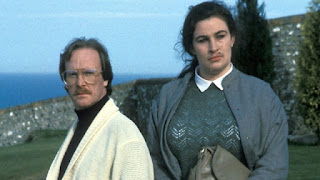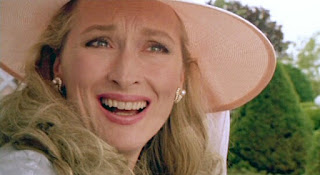Hey guys! Long time, no see. During this quarantine, I've been spending my weeks finishing up my novel and now that is finished, I'm back in the game! In preparation for the upcoming Vampire Chronicles review, I thought I take a look into the Nicolas Cage oddity that is Vampire's Kiss.
This may sound weird but I first watched this movie when I was a mere ten years old, something I wasn't supposed to be watching at that age, but don't worry, it was on the USA channel late one night. I...just didn't know what to think of this movie. It was one of those movies I can't quite put my finger on.
So I looked at this movie again for over a couple years and to my surprise, I found out that this was actually marketed as a comedy. Sure, Nicolas Cage is over-the-top and zany in this, but this movie is far from a comedy. It's, to be fair, quite disturbing.
It's more in the guise of a psychological thriller where you don't know what's real or not and towards the end, it turns into full-on horror. I could easily compare it to George A. Romero's Martin, as the horror in the movie is less mystical and more realistic.
Now this is going to be a long review and there's also going to be a bit of psychoanalysis of the 80s yuppie culture. So, brace yourselves, this is going to be a bumpy ride.
The Story: Peter Loew is a stereotypical arrogant yuppie who works in a literary agency in New York City. He usually spends his time club-hopping, picking up women, so on and so forth until he meets a woman that takes his life a turn for the worse.
Okay, I'm going to dedicate all my time to the examination of Nicolas Cage's performance and the character of Peter.
Right of the bat, he is already seeing a therapist and might have been seeing her for a while I presume. He usually boasts about his sexual conquests, his issues at work, yadda, yadda, yadda. Until he talks about one incident where he and his date Jackie encounter a vampire bat which oddly sexually arouses him.
As he continues to date Jackie, Peter suddenly becomes detached, standing her up at an art museum. This moment shows that he is completely unable to have a genuine relationship with a woman and might have slight misogynistic views of them.
This is when he runs into Rachel, a mysterious woman he meets at the bar.
During a sexual tryst, Rachel reveals himself to be a vampire and bites him on the neck. This is where Peter's mental state begins to deteriorate.
Now let's get into the subject of Rachel. This movie is clearly set in a world where vampires don't exist but Rachel is, in fact, a "vampire." An energy vampire. Yes, it is indicated at the start of the movie Peter is mentally ill but he doesn't start losing his rocker until he meets Rachel.
Patricia Arquette was originally set to play the role of Rachel but due to possible scheduling conflicts she wasn't available, so Jennifer Beals was cast. Although I do see Patricia Arquette in a role like this, Jennifer Beals does have an alluring presence about her that makes the role work. Nicolas Cage and Jennifer Beals reportedly didn't get along on set but I feel like the tension between them is what makes their chemistry palpable, considering that Beals is playing a vampiress that is literally sucking the life out of him.
Although Peter tries to make it up to Jackie, Rachel seems to get a hold on him. She may not be there physically but she is there mentally. Therefore, Peter is around her every whim.
It puzzles me that this movie is labeled a comedy. Sure, I did laugh at Nicolas Cage's overly hammy acting, whether intentional or not, but the treatment of Alva, I do not find funny at all. It was really hard to watch. Seeing this poor woman abused at the hand of her boss. It's extremely touchy and relatable to me because anybody in that situation would quit and report Peter's ass. Unfortunately for Alva, she has an overbearing mom who insists she must work to get ahead of her working-class situation. So, Alva has put up with Peter's bullshit throughout the duration of the movie.
On top of that, nobody seems to come to her aid. For instance, there's a scene where Peter is laughing and joking with his colleagues about him basically terrorizing Alva because of a missing file from 25 years ago. This guy actually chases her down all the way to the ladies' room with everyone in sight yet no one helps her and even his co-workers don't see it as a big deal. It showcases the toxic masculinity that these men have and how they treat their secretaries. Of course, this was the 80s which was way before MeToo.
It seems that Peter gets off on torturing Alva in amidst to his attraction to her. Her meekness is what excites his dominance, and therefore, he takes things too far.
Maria Conchita Alonso is mostly known for starring in action movies such as The Running Man and Predator 2. Here, she plays a put-upon secretary, which is far from her tough action roles. She is heartbreaking as Alva and is one of the few sympathetic characters in the film. By the climax, Peter does the unthinkable to her...
Lastly, we have Peter's therapist, Dr. Glaser, played by veteran actress Elizabeth Ashely, who's in a way, takes the role of Peter's conscience. She comes off like a mother figure, something that probably disturbs her. As a patient, Peter is a handful and is easily the most emotionally unstable. It's even to the point where Peter wakes her up in the middle of the night, (while having a rendezvous with her boy toy, no less) clearly showing that she's not always there to fix things for him until it's too late.
And now, we finally get to discuss Nicolas Cage's performance. It is out of this world. Though, there were many other actors considered for this role. Arnold Schwarzenegger and Sylvester Stallone, of all people, were considered. While Arnold and Sylvester can be good with what they're given, this would have not been it. There is also Actor Judd Nelson, who I can definitely see playing a character like this. Just like Nicolas Cage, he is a very method actor and would've pulled this role off splendidly.
But nothing tops above Nicolas Cage. He puts in his ALL. He even eats a live cockroach just to prove how much of a committed actor he is. His agent was hesitant about him taking on a project like this because, by that time his career was on a high, starring in critically-acclaimed films like Raising Arizona and the oscar-nominated Moonstruck, though, Nicolas Cage thought this project "spoke" to him more. How I describe his performance in the movie is a cross between an unhinged James Cagney and an outlandish Peter Lorre. Let me demonstrate by showing this: And Scene.
See what I mean? This is the Nicolas Cage we've come to know. And it's one of those moments in film where everybody else acts completely normal while the one main character is the one who's cartoonish and wacky.
I find his performance to be both hilarious and terrifying. Yes, I said terrifying. There is a point in the movie where Peter becomes less of an over-the-top goofball and way more threatening.
First and foremost, he definitely crosses the line when he sexually assaults Alva, his long-suffering secretary. Poor, poor Alva.
Then he really goes off his rocker and actually kills a woman at a club with a neck bite. When I first saw this, it caught me by surprise. This legitimately scared me and I was totally creeped out by Nicolas Cage for the rest of the movie.
This is when Peter starts to look more like a deranged Reinfeld than a suave, seductive vampire. Metaphorically, he is a man that literally turns into a monster. But the deep end of this character is his hostility towards women and that he can't seem to find the right one. Just pay attention to how all the women of his life tend to look-alike, which could be judged on possibly either having a distant mother figure or a woman he madly fell in love with that somehow broke his heart. Peter believes that if he finds true love, he'll be cured of his vampire curse. Even when he's talking to his therapist to where she sets him up with a potential love interest, ultimately, he doesn't get along with her from the start.
This all plays out in his disillusioned mind, however, and it gets to the point where he loses his grip on reality.
Through his fragile state of mind, Peter carries a huge wooden stake, and just when Alva's brother comes to defend her, Peter gives him the opportunity to impale him through the heart, instantly killing him.
This movie was...interesting. It was unlike anything I've ever seen as a kid and since then I've been checking out some weird arthouse films that are similar in tone. The movie has a very David Lynchian vibe to it. Ironically, a year later, Nicolas Cage would actually star in the David Lynch film, Wild at Heart. After that, Nicolas Cage continues to take more risks as an actor, which he associates with his unique acting style.
So, is it for everybody? I don't know but I still think it's an interesting psychological thriller that was pretty underrated for its time.
My Last Word: It's up to you. It's one of those movies where you have to wrap your head around though it's a definite must-watch.















































































